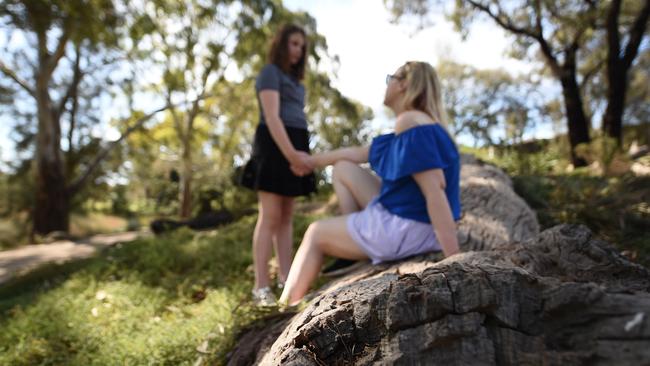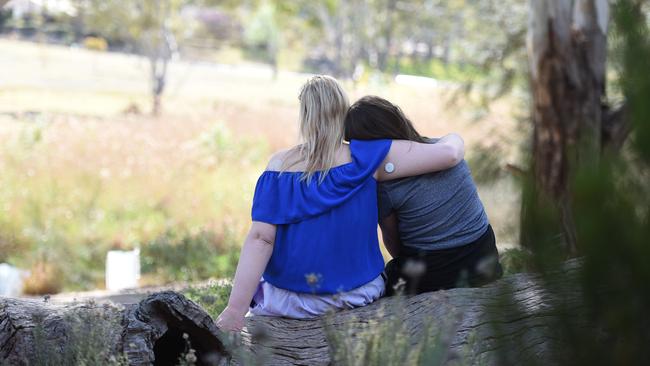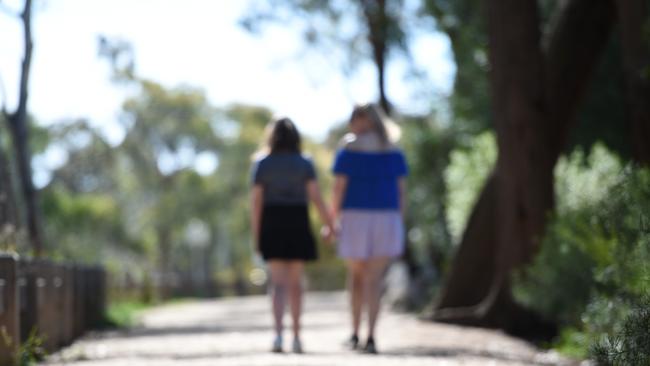‘Not okay’: Injured workers speak out on lengthy WorkCover delays, secondary injuries, need for faster reform
Injured workers who have been dealing with WorkSafe for years have spoken out against the WorkCover process, saying it causes extreme distress and – in the worst cases – severe mental health issues.

Geelong
Don't miss out on the headlines from Geelong. Followed categories will be added to My News.
A hand injury that should have been a simple fix has turned into years of pain and permanent disabilities for Geelong resident Kirsten.
Sitting in the house that’s become like a prison for her, Kirsten describes the moment her life changed.
When her now 12-year-old daughter was in kindergarten, in 2015, the single mother suffered a subluxation of the carpometacarpal joint of her right thumb – a partial dislocation of the thumb from its joint – while at work.
Kirsten alleges she was told to “just use the other hand”.
It’s a memory that still causes her discomfort, shaking her head while looking down at the hand that started it all, rubbing the place where the pain started.

From there, things just got worse.
She injured her left hand in the same way soon after, and was left unable to work.
Kirsten says she had to face a medical panel because her employer and WorkSafe were refusing liability – a process that took 18 months.
“I was treated horrendously,” Kirsten says, as one of her two dogs walks over and nudges her foot.
Kirsten claims this mistreatment and severe bullying led to another health hit in March 2017, when she developed shingles in the right trigeminal nerve in her brain.

The nerve provides sensory information, including touch, pain and temperature.
Kirsten says the shingles “destroyed” the nerve pathways through the right side of her brain, down her face, through the base of her ear, and into her neck, leaving her with chronic pain.
After taking time off because of the new injury, Kirsten says she returned to work part-time until she had an absent seizure.
She claims no one called an ambulance.
She says her doctor then advised her to be “done” attempting to return to work.
Eight years after her initial injury, Kirsten lives with chronic pain, carpal tunnel syndrome, constant migraines, adjustment disorder, chronic depression, and severe nocturnal hypoglycaemia, the last of which was caused by the pain medication she has to be on and is now permanent.
She’s no longer able to enjoy the activities she once did, like baking and cooking meals, and gardening.
Now, Kirsten says she doesn’t have the energy to stand up for long periods.
Before everything, she was the “fun mum”.
“It makes me sad,” her daughter says, as Kirsten strokes her hair.
“She can’t do as many things as a normal parent can do.”
Kirsten says her daughter’s been forced to grow up faster than her peers.
She says she’s focused on making the most out of every experience, because “I don’t know how long I’m going to be here”.
“It’s the reality,” she says.
Kirsten is not alone; hundreds of injured workers across Victoria are crying out for a change in the system.
Claims can take from a few months to a few years after an injury to process.
Workers are assigned an agent, who is in charge of addressing their claim and scheduling any medical treatment.
Michael, who withheld his surname, went through the WorkCover process last year, and says it was so mishandled and he was treated so poorly he’s been left with severe mental health issues.
In September, he made a third attempt on his life.
He says the process was “eating away” at him.
He says trying to navigate the system was like a “wild goose chase”.
Warren, who withheld his surname, first suffered a workplace injury a decade ago, to his right foot.
He suffered a second injury to an arm about two years ago, and says he wasn’t contacted by an agent for 14 months.
“Timeliness is paramount” he says.
“It’s a toxic system at the moment.”
Warren says the way injured workers are treated is “horrendous”.
Jonathan, not his real name, sustained a crush injury from a forklift at work in early 2022, injuring his spine.
He says his employer and WorkSafe denied liability, despite witnesses and CCTV footage of the incident.
He says because of mismanagement, he’s also had to make a secondary mental health claim.
Greta, not her real name, was initially injured in 2019.
She alleges she was assaulted at work in the morning, and was forced to continue working the rest of her shift, into the late afternoon.
She says she’s also developed mental health issues because of mismanagement.
Greta says over the four years she’s been trying to get her physical and psychosocial claims addressed, she developed anorexia, and has self-harmed.
“I’m pretty ruined from the process,” she says.
Greta’s former partner says she is not the same person she once was – all because her claim wasn’t acted on sooner.
According to WorkSafe, there were 1248 injured claims accepted in the 2022-23 financial year within the Greater Geelong, Surf Coast, and Queenscliffe area.
In 2019, the state government commissioned an independent review into the WorkSafe agent model.
Geelong-based Slater and Gordon senior associate Audrey Gunn says the review revealed the WorkCover scheme prioritises profits over injured workers’ health.
Ms Gunn says it’s vital anyone injured at work seeks legal advice early, to be informed of their rights and entitlements, and to make sure the process is as efficient as possible.
“Many workers are left with no option than to fight an insurer while dealing with an injury, coupled with receiving no income resulting in significant financial hardship and psychological distress,” she says.
“Many frontline healthcare providers blatantly turn away and refuse to treat injured workers if they have a WorkCover claim because they don’t want to have to navigate the scheme and fight to be paid and get the injured worker the treatment they need to recover.
“We need to see a scheme that is worker friendly; that puts medical treatment and rehabilitation at the forefront.
“We need a scheme that incentivises employers to work with their injured employees, and we need a scheme that encourages and supports the health care profession when they are presented with an injured worker.”
A WorkSafe spokesman said the organisation provided support to more than 98,000 injured workers last financial year.
“Improving outcomes and experiences on the scheme is a core priority,” he says.
“No one chooses to suffer an injury or illness at work and WorkSafe is committed to ensuring the correct supports are in place to care for those who do get injured so they have the best possible chance of recovery and return to work.”
Kirsten says there needs to be a drastic shift.
“Constant setbacks are just bullsh--,” she says.
“Losing your hobbies, losing who you are (is not okay).”
More Coverage
Originally published as ‘Not okay’: Injured workers speak out on lengthy WorkCover delays, secondary injuries, need for faster reform






